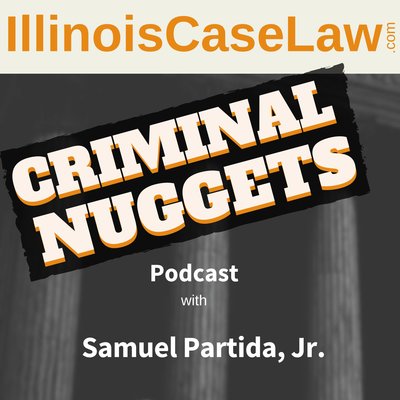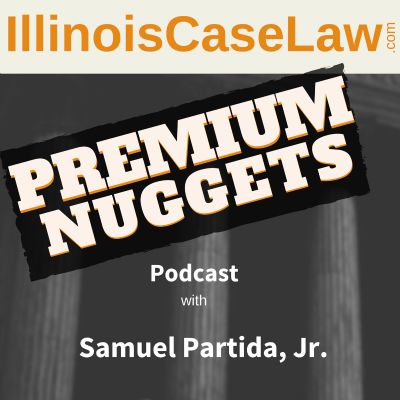May 13, 2019
People v. Nolan, 2019 IL App (2d) 180354 (April). Episode 627 (Duration 9:29)
Trial judge grants defendant’s motion to dismiss the indictment in part because the officer did not testify in the hearing.
Gist
This defendant filed a motion to dismiss the indictment. Trial judge granted the motion.
Facts
He testified at the hearing that he never told the officer the things the officer said he said. The officer never testified in the hearing and the state merely admitted the grand jury transcripts.
The trial judge noted that, in reviewing the transcript, “it’s like the prosecutor in this case testified.”
Trial Court Ruling
The court acknowledged that leading questions are permitted in grand-jury proceedings, but it commented that “sometimes the leading questions may get out of hand and present a false indication as to what actually happened.”
The court observed that the State could have called the officer to say “He really told me that” but they didn’t.
Point Of The Grand Jury
The grand jury determines whether probable cause exists that an individual has committed a crime, thus warranting a trial. 725 ILCS 5/112-4.
Interposing a grand jury between the individual and the government limits indictments for higher crimes to those offenses charged by a group of one’s fellow citizens acting independently of the prosecution and the court. In a sense it serves as a check on the prosecution. See United States v. Hogan, 712 F.2d 757, 759 (2d Cir. 1983).
In this independent position, a grand jury performs two distinct roles.
(1) It serves as an accuser sworn to investigate and present for
trial persons suspected of wrongdoing.
(2) At the same time—and equally important—it functions as a
shield, standing between the accuser and the accused, protecting
the individual citizen against oppressive and unfounded government
prosecution.
Challenging A Grand Jury
To preserve the grand jury’s independence in performing these vital roles, challenges to grand-jury proceedings are limited. DiVincenzo, 183 Ill. 2d at 255.
In general, a defendant may not question the validity of an indictment returned by a legally constituted grand jury. A defendant may not challenge the sufficiency of the evidence considered by a grand jury as long as some evidence was presented.
Narrow Exception To Challenge An Indictment
A defendant may, however, challenge an indictment that is procured through prosecutorial misconduct.
A defendant’s due-process rights can be violated if the prosecutor deliberately misleads the grand jury, knowingly uses perjured or false testimony, “or presents other deceptive or inaccurate evidence. However, the denial of due process must be “unequivocally clear” and the prejudice “actual and substantial.” People v. Holmes, 397 Ill. App. 3d 737, 741 (2010) (quoting People v. Oliver, 368 Ill. App. 3d 690, 695 (2006)). See Franks v. Delaware, 438 U.S. 154, 155-56 (1978).
A Franks Hearing
Episode 134 – People v. Chambers, 2016 IL 117911 (January) (Defendant presented enough information such that he should have been granted a Franks Hearing, People v. Gorosteata, 374 Ill. App. 3d 203 (2007) is overruled.)
The purpose of Franks is to provide meaningful, albeit limited, deterrence of and protection against perjurious warrant applications.
The State contends that something more is necessary than a defendant’s testimony contradicting some aspect of the grand-jury testimony. Otherwise, the State argues, before trial on the merits a defendant could always insist on a kind of preliminary trial to determine the competency and adequacy of the evidence before the grand jury.
The State points out that the reported cases have uniformly involved some type of objective proof that the grand-jury testimony in question was false or misleading.
How To Get A Franks Hearing
Under Franks, if a defendant makes a “substantial preliminary showing” that a false statement was deliberately or recklessly included in an affidavit for a search warrant, and if the allegedly false information was critical to the probable-cause showing, the defendant is entitled to a hearing on whether the information was in fact false.
To challenge a grand jury indictment Defendant must make a substantial preliminary showing that is more than a mere request and more than an unsubstantiated denial and certainly something less than proof by a preponderance.
First, the challenger’s attack must be more than conclusory and must be supported by more than a mere desire to cross-examine.
Second, there must be allegations of deliberate falsehood or of reckless disregard for the truth.
Third, those allegations must be accompanied by an offer of proof” and must “point out specifically the portion of the warrant affidavit that is claimed to be false.” The defendant must furnish affidavits or sworn or otherwise reliable statements of witnesses.
What Is A Substantial Preliminary Showing
In People v. Lucente, 116 Ill. 2d 133 (1987), the court considered what was needed to make the “substantial preliminary showing.” The court balanced the interest in permitting defendants a meaningful chance to make the required showing against the possibility of opening the floodgates to spurious challenges.
The court held that “Franks demands something more than a request, and even more than a defendant’s unsubstantiated denial.” Id. at 151. If no more were required, “Franks hearings would be held in every case.” Mini trials before the real trial would be commonplace.
The State argues that the same concerns are present here.
Actually, no case discusses the quantum of proof necessary to establish a due-process violation based on false or misleading testimony. We leave for another day whether Franks provides the applicable standard for establishing due-process violations. However, we agree with the State that, at least under the facts here, defendant’s testimony did not warrant dismissing the indictment.
This Case
Here, nothing contradicted the officer’s grand-jury testimony except defendant’s testimony. The only evidence that the officer’s grand-jury testimony was false was defendant’s self-serving testimony in which he recalled the conversation differently.
There was no admission by the State or documentary evidence establishing that the grand-jury testimony was inaccurate.
The trial court’s real concern seems to have been the perfunctory way the case was presented to the grand jury, the court observing that the prosecutor appeared to be testifying. We are not unsympathetic to the trial court’s frustration with the prosecution’s cursory grand-jury presentation.
However, courts confronted with the issue previously have held that leading questions are permissible in grand-jury proceedings. See People v. Hirsch, 221 Ill. App. 3d 772, 779 (1991) (no “requirement that testimony before a grand jury cannot consist of monosyllabic responses”).
Holding
To allow a challenge such as defendant’s here would allow virtually any defendant to move to dismiss the indictment, deny having committed the offense, and argue that any contrary testimony before the grand jury was necessarily false.
Additionally, requiring the State to re-present its case at the hearing would negate the grand jury’s historic independence in performing its vital functions, making the court the ultimate arbiter of probable cause.
Moreover, as the State points out, such a practice would also usurp the role of the petit jury. At bottom, the court’s decision here was based on its finding that defendant’s testimony at the hearing was credible. The State is correct that it is the jury’s function to resolve factual disputes, assess witness credibility, and determine the sufficiency of the evidence.
The judgment of the circuit court of Winnebago County is reversed and the cause is remanded for further proceedings.
See Also
- Episode 610 – People v. Rebollar-Vergara, 2019 IL App (2d) 140871 (March) (Prosecutors Questions Could Have Been Presented More Clearly And Completely In The Grand Jury Room But No Misconduct Here)
- Episode 144 – People v. Boston, 2016 IL 118661 (February) (This was very sloppy grand jury questioning but no prejudice to defendant resulted.)
- Episode 615 – People v. Garcia, 2019 IL App (2d) 161112 (March). (Prosecutor used an inartful example to illustrate accountability, but this was not plain error.)
- Episode 067 – People v. Williams, 2015 IL App (1st) 122745 (March) (Improper Witness Vouching | Was This Prosecutor Vouching For His Witness?)
- Episode 047 – People v. Haynes, 2015 IL App (3d) 130091 (January) (Did the prosecutor instruct a witness to lie at trial?)
- Episode 257 – People v. Jones, 2016 IL App (1st) 141008 (October) (Prosecutor Made The Statements But Trial Judge Gets Slapped Around)
- Episode 165 – Prosecutor Quits After Allegation Of Perjury
- Episode 148 – People v. Weinke, 2016 IL App (1st) 141196 (March) (court could not ignore the misrepresentation made by the state)
- Episode 127 – People v. Mpulamasaka, 2016 IL App (2d) 130703 (January) (Prosecutorial Misconduct Leads to Rape Reversal)
- Episode 333 – People v. O’Dette, 2017 IL App (2d) 150884 (March) (How Not To Run A Grand Jury Every Single Detective In Lake County Is Sworn In As a Grand Jury Investigator | Subpoena Abuse Ensues)
- Episode 596 – In re Appointment of Special Prosecutor, 2019 IL 122949 (January) (Grand Jury Secrecy Is Kind Of A Big Thing Press Not Allowed To Get Some Documents)



